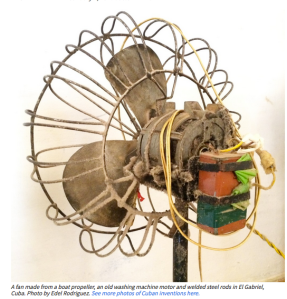If during republic and dictatorship Cubans adequately summoned the lords of cargo and led the island into a secular order of consumption, then the Revolution of 1959 sent that American modernization into a Cold War remission, one in which the Soviet Union stepped in as the new Cargo kings. In the wake of the collapse of Soviet subsidies and soviet structured import and export markets, Cuba turned to China, to Europe, to Venezuela. But the cargo could not compensate for the broad range of commodities that the Soviet years had brought, and the embargo, and its reinforcement in the Helms Burton Bill, became a new looming reminder of the cargo that could not be. Now, if a cargo cult is a set of practices that mimetically reconstitute the actions, instruments, and signs that can summon cargo, then the Cuban state, by continuously invoking the embargo as a condition of collective existence, has in effect created a cult of negative cargo, a cult of scarcity, of that which never comes, can never come. It remains to be seen if this cult is at an end.
At the same time, Cubans practiced in this negative cargo cult follow other promiscuous practices, summoning cargo that comes in remittances, suitcases, carried by mules from Miami or boats from Venezuela. In the interval, Cubans have had to “resolver,” particularly the many still excluded from circuits of remittances and excluded from the new cargo cults. This ingenuity in the face of scarcity, this time without the planned obsolescence of commodities or politics, is read periodically with anthropological enthusiasm by fascinated observers. Whether old Buicks lovingly maintained, “hacked” ventiladores like those in the picture below, or repaired elevator circuits, these improvisations, now read as “hacks,” is read as a “know how,” an ingenious techne that has been lost in the world of intense commodification. Reading Cubans as hackers both frames them as somehow primitive and signals the way they might be models for our future encounters with some post apocalyptic scarcity.
The many articles celebrating Cuban ingenuity, like the one linked below, is part of the old/new discourse and logic of instrumentality and know how. The cargo of American goods promises as well, the restoration of the proper techne kept alive for so long by ingenious Cubans. The market will either render useless or make “artisanal” practice of this know-how: a know how that will have to be dedicated to fusing and integrating machines and logics from different orders of production: the hardware and software of capital, analog and digital technolocy, state capitalism and entrepeneurship. Those Cuban Cargo Cultists who kept alive a sparse techne for so long can now be rewarded with real products in place of their functioning bamboo airplanes: but what will happen to that profitless production? A museum of Cuban improvisation, the hacks of mixed economies. In this attention to Cuba comes a projection about our relationship to objects, to the commodity, to time and the forms of knowledge discarded, from wiring and saudering to socialism. “No ideas but in things” is part of the new liberalism (market and otherwise) now aimed at Cuba. Empire, democracy, who cares? Just get the right air conditioner and flat screen. Or the right financial instruments. What is the PIN to the Cuba account? A nation of hackers should be able to figure it out.
**Thanks to John Pat Leary for “breaking” the NPR link below and for the critiques of innovation in his blog, “Keywords for the Age of Austerity.”
http://jpleary.tumblr.com/post/78022307136/keywords-for-the-age-of-austerity-innovation
Ana Dopico, February 1, 2015
